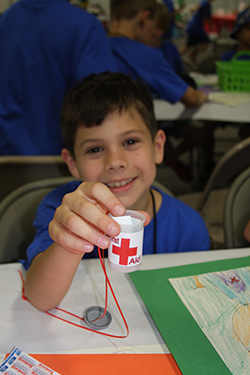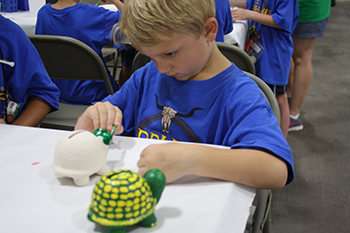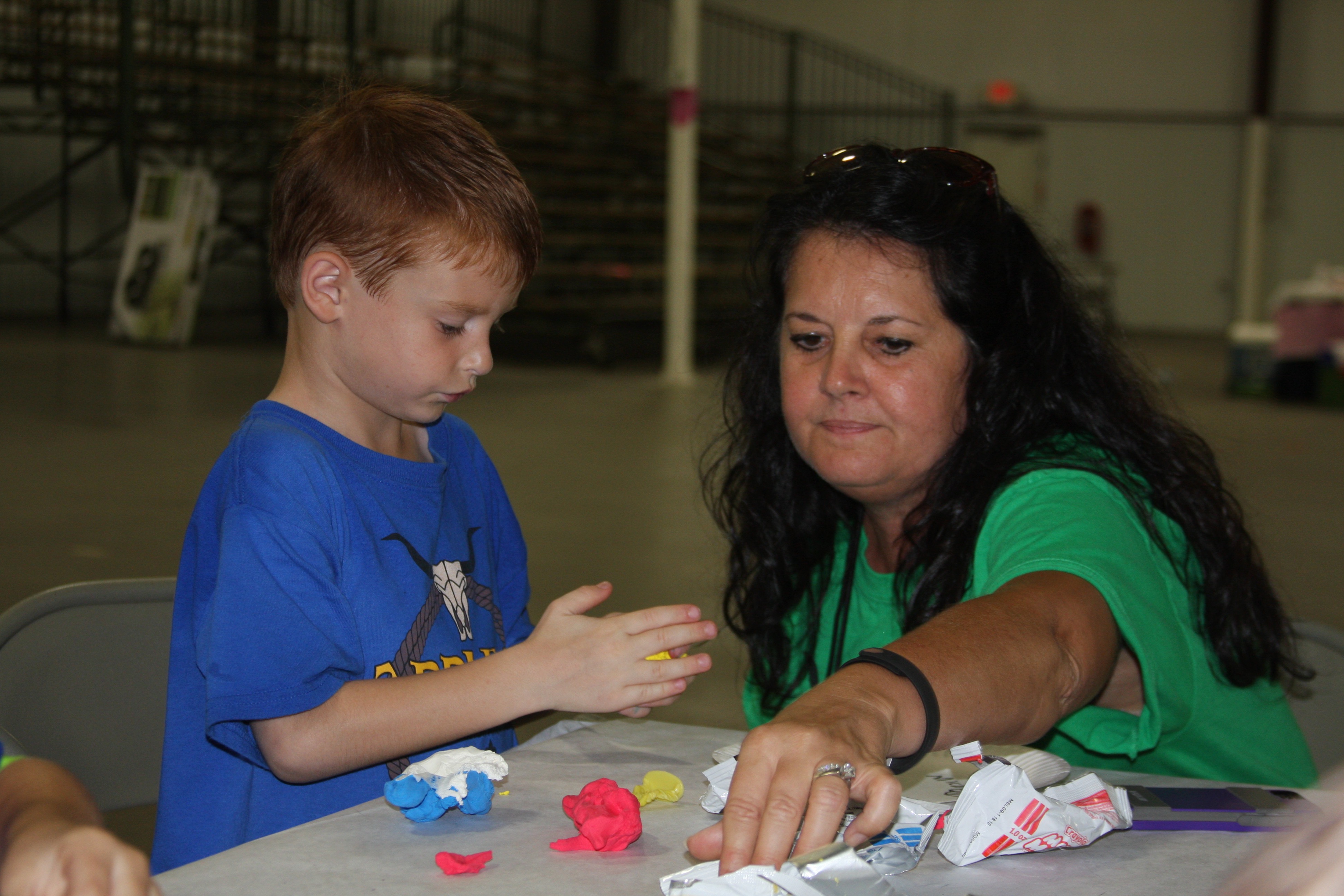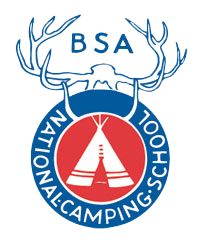

Get ready to travel back in time for an unforgettable adventure! This year’s Cub Scout day camp is going prehistoric. Day damp is an opportunity for Cub Scouts entering 1st – 5th grade during the next school year to make new friends, earn rank advancements, and enjoy BB guns, archery, sports, skills, and crafts. The camp is a council camp organized by districts and conducted by volunteers from the local area.
Many volunteers are needed to make camp a success, so please consider volunteering. Adult volunteers can also register their children (ages 3-5 and potty trained) . Scouts in troops, crews, and ships can also volunteer. An adult/guardian must register and attend with Tiger Scouts (going into 1st grade).
Program
In addition to shooting BB guns and archery, and playing sports, Scouts will be working towards achieving parts of the following adventures (advancements).
Below is a list of potential adventures. Depending on the camp size, duration and capacity only some adventures from each rank will be completed. A full list of the camps adventures will be provided after camp.


Registration
The registration fee is $80 for Scouts and $15 for adults and Tot Lot. The registration fee includes a t-shirt, patch, and program supplies. All youth entering 1st grade through age 18 must be registered with Scouting America. A registered parent/guardian must always be onsite when tot-lots (siblings ages 3-5) and Tigers (going into 1st grade) are at camp.
Register
- Late fee begins May 12, 2025
- Registration closes two weeks before camp.

 Have carpool contacts (must have at least one) before beginning the registration process. It is very important to complete the entire process (through payment). All incomplete registrations are deleted every evening at midnight.
Have carpool contacts (must have at least one) before beginning the registration process. It is very important to complete the entire process (through payment). All incomplete registrations are deleted every evening at midnight.
Payment: At checkout, pay with a credit card, or electronic check. Council refund policy.
Volunteers: Many volunteers are needed to make camp a success, so please consider volunteering. Adult volunteers can also register their non-Scouting children ages 3-5 (potty trained). Scouts in troops, crews and ships ages 11-17 can register as volunteers. A registered parent/guardian must be onsite at all times when tot-lots and Tigers are at camp. Each pack must have a minimum of one adult registered for every four youth registered.
Pack Camp Coordinators: Each pack should have two camp coordinators to help organize the adult to camper ratio. The pack leadership should email the names of the camp coordinators to daycampthunderwolf@gmail.com. Adults should notify their pack’s day camp coordinator that they have registered so they can ensure the 1:4 (adult: youth) ratio.
Youth registration requirements:
- Complete online registration
- Submit a copy of the Health and Medical form (Parts A & B: All Scouting Events) to the pack representative
- Submit a copy of medical insurance card, front and back (if insured) to the pack representative
Adults registration (ages 18+) requirements attending camp:
- Complete online registration
- Submit a copy of the Health and Medical form (Parts A & B: All Scouting Events) to the pack representative
- Submit a copy of medical insurance card, front and back (if insured)
- Submit proof of Safeguarding Youth Training (SYT) online at my.scouting.org. This is a mandatory requirement by the state.
- Attend Camp Volunteer Orientation. This is mandatory every year by the state.
What to Bring to Camp

 camp t-shirt (get this from your pack representative)
camp t-shirt (get this from your pack representative)- face-covering/mask
- Annual Health and Medical Record (parts A and B for all Scouting events), if not already submitted
- very hydrated Scout (have them drink lots of water all day and a full water bottle on the way to camp)
- sack dinner and snacks (nonperishable in a resealable plastic bag with name and camp den number). See details below.
- non-carbonated drink for meal (water, sports drink, juice box)
- water bottle
- hand sanitizer, small personal bottle
- bandana, optional
- closed-toed shoes with socks
- hat and/or sunglasses
- rain poncho
- sunscreen (applied by parent before camp)
- insect repellant (applied by parent before camp)
- 5-gallon bucket with a lid to use as a chair (Scout must carry the bucket). Available at places like Home Depot, Lowes or Academy.
- money for trading post treats (quarters in a resealable plastic baggie), optional
- medications that need to be taken at camp must be in the original containers and turned into the health and safety chair. Scouts can carry their Inhaler or Epipen; however, the health and safety chair and camp staff must be notified.
Mark all items marked with name
Do Not Bring

 No aerosols of any kind in camp
No aerosols of any kind in camp- No carbonated drinks; they dehydrate the body.
- No eggs
- No mayonnaise
- No tuna or chicken salad
- No excessive sweets
- No perfume
- No eating during sessions – if there is a medical issue, please alert the camp director.
- No trading cards
- No pets
- No electronics – Nintendo DS, IPod, MP3, cell phones, radios, etc.
Meal Requirements
Everyone attending camp will be required to bring a meal. Juice boxes or sports drinks work best. Please do not send carbonated drinks. Use resealable plastic gallon-sized bags with the Scout's name written on it. Ice water will be available at meals and every activity area.
Please check with the parents in your den concerning any allergies (e.g., peanut).
Consider: frozen grapes, frozen bananas sliced, watermelon, strawberries, carrot or celery sticks with peanut butter, broccoli, beef jerky, peanut butter and jelly sandwiches, peanut butter or cheese crackers, canned tuna or chicken, trail mix, dried fruit, pickles, crackers and hard cheeses (e.g., cheddar, Colby, provolone), pudding cup, fruit cups, applesauce cup, chips, raisins, dried fruit, almond butter, yogurt raisins, granola bar, summer sausage, crackers, Goldfish, pumpkin seeds, protein bar, dry cereal, muffins. Perishable or refrigerated foods, such as mayonnaise, meats, eggs, or leftovers are not allowed at camp.
Advancements
There are several opportunities for Cub Scouts to earn advancement at camp. A list of advancements covered will be sent home the last day of camp. The list needs to be given to the Scout's den leader.
Lost and Found
Lost and found will be located at registration. Leftover items are donated to charity after camp. Please label all items taken to camp.
Medication
All medications (with the exception of inhalers, emergency epinephrine kits, and diabetes kits) must be checked-in to the health and safety director in the first aid area by the parents of the child requiring the medications. Each medication must be in the original prescription container with only enough medication for the week, clearly labeled with the Scout’s name, dosage, and specific time(s) medication should be taken. A medication form will need to be filled out. Other than using an inhaler, Epi-pens or diabetes kits, no child should be taking any medication except while in the first aid area. Please inform the Scout's leader and the health and safety officer of any medications that need to be taken at camp. See the health and safety director at camp if there are any questions.
Photographs
Notice! Please be advised that promotional videotaping/photography may be in progress at any time at an event. Your entrance constitutes your agreement that the council and district has the right to reproduce your likeness in videography/photography for promotion (e.g., publications, internet, newspaper).
Volunteer Information
Day camp is run by volunteers. Each pack is required to provide a minimum of one adult register for every three youth register per pack. If the pack does not meet this ratio, then the pack will not be able to attend camp. Please consider volunteering.
Volunteer Training
The state of Texas requires that all adults attending camp must:
1. Submit proof of Safeguarding Youth Training (SYT) online at my.scouting.org.
2. Attend Camp Volunteer Orientation
- Option 1 - Thursday, May 29, 2025, 7:00 - 8:00 pm (Zoom)
- Option 2 - Saturday, May 31, 2025, 10:00 - 11:00 am (Zoom)


Volunteer Opportunities
Volunteering at camp is fun. Many opportunities are available:
- Adult partner with a Tiger Cub
- Den walker (escort a group of ~10 Scouts from one area of camp to another)
- Archery range (must be certified)
- BB gun range (must be certified)
- Crafts
- Health and Safety (must be certified)
- Facilities
- Registration
- Scouting skills (teach advancements)
- Security
- Sports and games
- Tot lot (preschool program)
- Key staff


First Aid/CPR/AED: A minimum of one person per 25 people onsite needs to be trained in First Aid/CPR/AED. If you have current certification, please submit a copy of your certification and indicate during registration. If you would like training, find an upcoming course near you.
Range Masters: Eight certified Range Masters are needed to help on the BB and archery ranges. If you have current certification, please submit a copy of your certification and indicate during registration. If you would like training, find an upcoming course near you.
Volunteer Options
- Full-Time Volunteer - will be at camp every day from opening to closing
- Job Share Volunteer - two adults split the camp and both adults will ensure coverage for every day from opening to closing. This counts as one volunteer in the required adult to Scout ratio.
- Part-Time Volunteer - an adult who volunteers for part of the camp. Part-time volunteers do not count in the required adult to Scout ratio.
- Key Staff – Volunteer who has been specifically asked by the camp director to serve as a key staff.
Scouting Safely


Scouting America's Commitment to Safety is ongoing, and the safety of our youth, volunteers, staff, and employees cannot be compromised. Scouting America puts the utmost importance on safe and healthy environments for its youth membership. The Sam Houston Area Council takes great strides to ensure the safety of its youth as well as the adult volunteer leadership that interacts with them.
Guide to Safe Scouting policies must be followed. All participants must follow youth protection guidelines at all Scouting events. Highlights include:
- Two-deep leadership on all outings is required.
- One-on-one contact between adults and youth members is prohibited.
- The buddy system should be used at all times.
- Discipline must be constructive.
Health and safety must be integrated into everything we do, to the point that no injuries are acceptable beyond those that are readily treatable by Scout-rendered first aid. As an aid in the continuing effort to protect participants in Scout activities, the National Health and Safety Committee and the Council Services Division of the National Council has developed the SAFE Checklist of safety procedures for physical activity. These points, which embody good judgment and common sense, are applicable to all activities.
*About Medical Record: Scouting America requires all participants to bring an Annual Health and Medical Record to every Scouting event. The Scouting adventures, camping trips, and having fun are important to everyone in Scouting—and so is your safety and well-being. Completing the Annual Health and Medical Record is the first step in ensuring you have a great Scouting experience. Completing a health history promotes health awareness, collects necessary data, and provides medical professionals with critical information needed to treat a patient in the event of an illness or injury. It also provides emergency contact information. Please download the form and have it with you at all Scouting events for every member of your family.
^Closed-toed shoes are highly recommended for all Scouting events. Many of our outdoor venues have snakes and sticks that can injure toes. Many of our activities include active games, so shoes that Scouts can run in (e.g., tennis shoes) are recommended.
Youth Protection Guidelines Guide to Safe Scouting SAFE Checklist Enterprise Risk Management
Standards

 Camps are operated and licensed under the guidelines of the Scouting America National Camp Standards. Camps are inspected annually by the NCAP team to ensure compliance with the National Camp Accreditation Program (430-056), Day Camp Administrative Guide (13-33815), Cub Scout Outdoor Program Guidelines (510-631), and the Guide to Safe Scouting.
Camps are operated and licensed under the guidelines of the Scouting America National Camp Standards. Camps are inspected annually by the NCAP team to ensure compliance with the National Camp Accreditation Program (430-056), Day Camp Administrative Guide (13-33815), Cub Scout Outdoor Program Guidelines (510-631), and the Guide to Safe Scouting.
The Texas Department of State Health Services Youth Camp Program is the principal authority on matters relating to health and safety conditions at youth camps in Texas. All youth camps must obtain a license prior to operating. Any youth camp may be inspected during operation to determine compliance with the Youth Camp Safety and Health Act and the Youth Camp Rules.